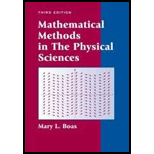
Evaluate each of the following definite
Want to see the full answer?
Check out a sample textbook solution
Chapter 8 Solutions
Mathematical Methods in the Physical Sciences
Additional Math Textbook Solutions
A Survey of Mathematics with Applications (10th Edition) - Standalone book
Mathematics All Around (6th Edition)
Mathematics with Applications In the Management, Natural, and Social Sciences (12th Edition)
Using & Understanding Mathematics: A Quantitative Reasoning Approach (7th Edition)
Finite Mathematics & Its Applications (12th Edition)
- Algebra & Trigonometry with Analytic GeometryAlgebraISBN:9781133382119Author:SwokowskiPublisher:Cengage


